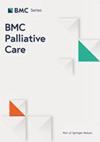摘要
背景介绍姑息关怀是为患有局限生命疾病的患者提供的服务,其重点是缓解疾病症状和压力。以往的研究表明,在疾病进程的早期提供专业姑息关怀咨询可提高患者的生活质量、减轻症状负担、减少医院急症护理服务的使用并延长患者的生存期。然而,对于早期姑息关怀(EPC)一词存在着不同的定义:目的:研究文献中如何为患有生命受限疾病的成年人定义早期姑息关怀:本综述根据系统综述和荟萃分析首选报告项目(PRISMA)扩展范围综述指南进行,并遵循乔安娜-布里格斯研究所(Joanna Briggs Institution)的范围综述方法。文献检索使用了 MEDLINE (Ovid)、CINAHL (EBSCO)、Embase (Ovid)、PsycINFO (Ovid)、Web of Science Core Collection、Ovid Cochrane Library 和 ProQuest (Health and Medicine and Sociology Collections)。所有检索到的文章均由三位独立审稿人进行筛选:结果:2008 年至 2024 年间有 153 篇文章符合纳入标准。为了组织定义,我们创建了 EPC 的五类定义:(1) 基于时间(如从晚期癌症诊断到开始 EPC 的时间);(2) 基于预后(如预后或 "意外问题");(3) 基于地点(如医疗系统内的接入点,如门诊环境);(4) 基于治疗(如医生判断或特定疗法之前);(5) 基于症状(如使用症状强度问卷)。许多研究纳入了癌症患者(103 人),最常见的定义类别是基于时间(53 人)。在关注多重或非癌症诊断的研究中(n = 50),最常见的定义类别是基于症状(n = 16):我们的研究结果为那些希望了解癌症和非癌症疾病中现有 EPC 定义的范围和广度并考虑其在临床实践中的应用的人提供了一个有用的参考点。Background: Palliative care is for people suffering from life-limiting illnesses that focuses on providing relief from symptoms and stress of illness. Previous studies have demonstrated that specialist palliative care consultation delivered earlier in the disease process can enhance patients' quality of life, reduce their symptom burden, reduce use of hospital-based acute care services and extend their survival. However, various definitions exist for the term early palliative care (EPC).
Objective: To investigate how EPC has been defined in the literature for adults with life- limiting illnesses.
Methods: This review was conducted in accordance with the Preferred Reporting Items for Systematic Reviews and Meta-Analysis (PRISMA) extension for Scoping Reviews guidelines and follows the Joanna Briggs Institution methodology for scoping reviews. The literature search was conducted using MEDLINE (Ovid), CINAHL (EBSCO), Embase (Ovid), PsycINFO (Ovid), Web of Science Core Collection, Ovid Cochrane Library, and ProQuest (Health and Medicine and Sociology Collections). All articles retrieved were screened by three independent reviewers.
Results: 153 articles met the inclusion criteria between 2008 and 2024. Five categories of definitions for EPC were created to organize definitions: (1) time-based (e.g. time from advanced cancer diagnosis to EPC initiation); (2) prognosis-based (e.g. prognosis or the 'surprise question'); (3) location-based (e.g. access point within the healthcare system such as outpatient setting); (4) treatment-based (e.g. physician's judgement or prior to specific therapies); and (5) symptom-based (e.g. using symptom intensity questionnaires). Many studies included patients with cancer (n = 103), with the most common definition category being time-based (n = 53). Amongst studies focusing on multiple or non-cancer diagnoses (n = 50), the most common definition category was symptom-based (n = 16).
Conclusion: Our findings provide a useful reference point for those seeking to understand the scope and breadth of existing EPC definitions in cancer and non-cancer illnesses and contemplate their application within clinical practice.

 求助内容:
求助内容: 应助结果提醒方式:
应助结果提醒方式:


